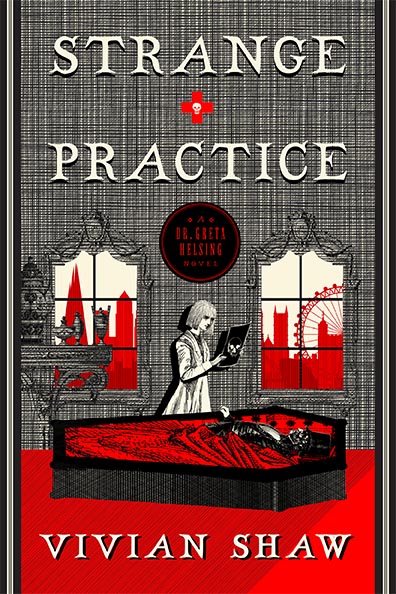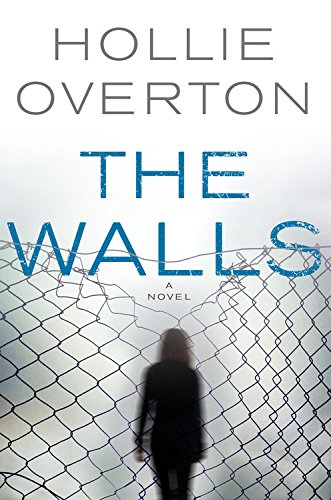
This week on The Scariest Part, my guest is author Vivian Shaw, whose debut novel is Strange Practice. (I had the pleasure of meeting Ms. Shaw briefly at this year’s Readercon, and now I’m even more excited to read this novel!) Here is the publisher’s description:
Meet Greta Helsing, doctor to the undead.
Dr. Greta Helsing has inherited the family’s highly specialized, and highly peculiar, medical practice. She treats the undead for a host of ills — vocal strain in banshees, arthritis in barrow-wights, and entropy in mummies.
It’s a quiet, supernatural-adjacent life, until a sect of murderous monks emerges, killing human and undead Londoners alike. As terror takes hold of the city, Greta must use her unusual skills to stop the cult if she hopes to save her practice — and her life.
And now, let’s hear what the scariest part was for Vivian Shaw:
In the end, for me, fear is largely defined by the unknown. Fear of what might be lurking behind the last locked door, or beyond the mirror-black windowpane at night; under the bed; in the recesses of one’s own psyche. The unknown is a vast blank space in which our minds can come up with much more terrible things than are likely to be there, and this is both terrifying and delicious, the way looking down from a great height can feel exhilarating.
But most monsters, once you encounter them, are there to eat you. It’s simply a question of how.
The scariest part of my book, Strange Practice, is that the monster is not under the bed, or in the closet, or the back seat of the car: the monster is inside people’s heads, and it has slotted its way into the part of their heads that is reserved for faith. For some other periods in its long, long existence, it has pretended to be the voice of conscience, or an oracle whispering in the mind’s ear. It is just clever enough to be indistinguishable from what it purports to represent.
This monster — this entity — exists solely to consume. Unlike some monsters, however, it is not only a predator: it manipulates its prey in order to coax from them the substance it particularly enjoys. It’s a fairly well-known concept; Stephen King has written several pounds of literature about creatures that feed on fear, in one way or another, and what I’ve done is in no way groundbreaking — but the thing I wrote about is particularly nasty in the way it gets inside your head. Of note, additionally, is the way in which it transmits its power to the people under its control, and this was particularly entertaining to write: I have always loved the delightful spookiness of old-fashioned electrical technology, and getting to feature that as a talismanic, supernatural focus of belief was fun.
Because the thing in Strange Practice is clever, in a blind cunning kind of way. It finds its way into your mind, and works out what it is you believe, and like a radioactive isotope of some element you actually want or need, it fits itself into that hole and takes advantage of your mind’s own pre-existing settings. It has been many gods, to many people, over the millennia. It is good at languages. It picks up quite quickly, and seamlessly, the cadence and vocabulary associated with various forms of scripture. What it wants, more than anything else, is to feed — and what it feeds upon is pain and fear and hatred.
In playing with this particular monster I spent a lot of time reading through various passages of scripture to find phrases and sentences that could be repurposed to serve its ends. One of my characters, Edmund Ruthven — a vampire who has been around for over four hundred years, one way and another — explains a little of why this specific monster is so unspeakable:
“Imagine you’ve prayed all your life,” he continued, “that you’ve been taught to pray, taught to believe that you must give praise in prayer and that you are not to expect the blessing of hearing anything ever answer back — that expecting anything to reply to you is hubris and wickedness — but one day there’s this little voice, this still small voice, that does reply. And you believe it and you love it and you worship it, just as you have been taught to all your life…and it shows you wonderful things inside your head, and takes away your fear and pain. And it tells you how to make things…and where to go…and what to do to people with those things, once you get there.”
What it wants is to feed, and what it eats is fear and loathing, and it is not the creature itself but the way in which it takes its meal which I find the most frightening — perhaps because it is so difficult to disprove. There is no way to be absolutely certain that the little voice in the back of your head is your own. The monster under the bed and the monster in the closet, in the depths of the ocean, in the long shadows of the wood, are identifiable as themselves: a predatory other, waiting for you. The truly scary part of my book is that the monster itself inhabits your own perceptions, shaping itself to fill the holes already waiting for it, and it might already be in there. Might have been there all along.
In Strange Practice, there are authorities which keep an eye on things to (hopefully) prevent any such occurrences. In the real world? Well, you take your chances — and stay away from 1940s electrical technology, at least in caverns under the earth. Can’t be too careful, after all.
Strange Practice: Amazon / Barnes & Noble / Powell’s / IndieBound
Vivian Shaw: Website / Twitter
Vivian Shaw was born in Kenya and spent her early childhood at home in England before relocating to the US at the age of seven. She has a BA in art history and an MFA in creative writing, and has worked in academic publishing and development while researching everything from the history of spaceflight to supernatural physiology. In her spare time, she writes fan fiction under the name of Coldhope.
 The Changeling by Victor LaValle
The Changeling by Victor LaValle


